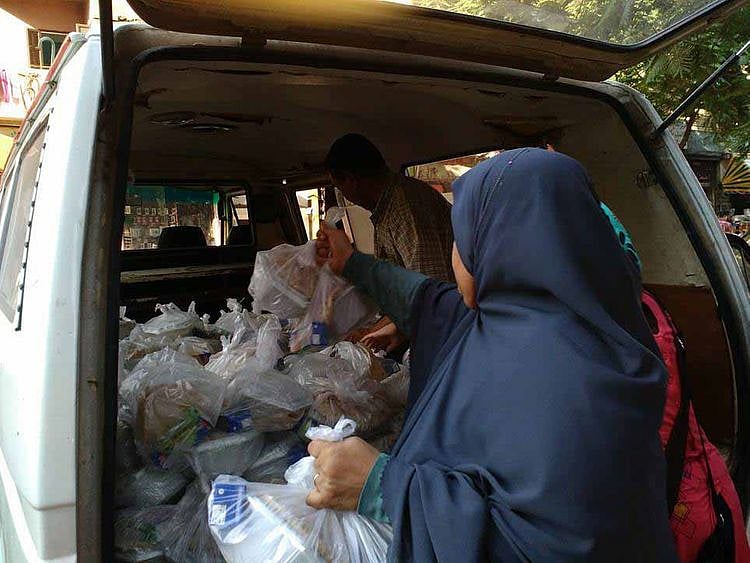Giza, Egypt: The sunset was a few hours away. In the Muslim holy month of Ramadan, this is the time to go home to join the family for the fast-breaking iftar meal. The streets in this city near Cairo were virtually choked with a pandemonium of motorists and pedestrians jostling in the pre-iftar traffic rush.
For Mohsen Sorour and Rami Abdul Ghani, it was not the time to go home.
It was the time for the two young men to be out on the street to give away charity food.
The two are part of a voluntary group in Giza, a city famed for the Pyramids, who annually go to nearby villages in order to deliver free food meals to the poor in Ramadan.
Muslims abstain from eating, drinking and smoking from dawn to dusk everyday in this month, one of the holiest in the lunar Islamic calendar.
“The idea started more than two years ago when Egypt floated the pound, driving prices of everything up,” said Sorour, an owner of a gift shop.
In late 2016, Egypt depreciated the value of its currency and slashed state subsidies on energy as part of austerity measures, which the government said were necessary in order to heal the ailing economy. The measures earned Egypt a bailout loan of 12 billion dollars over three years from the International Monetary Fund.
“This [austerity] made it hard for the poor to afford essential commodities even food. I thought with a group of friends of doing something in order to help the poor in Ramadan,” the 29-year-old man told Gulf News.
The two friends started raising donations for buying cooked meals and delivering them to the poor villagers.
“We thought this is more dignified to the poor, who are too shy to go to Mawaed Al Rahman,” Abdul Ghani, the other volunteer, said, using a local term referring to street charity meals, an age-old feature of Ramadan in Egypt.
“Our neighbours and mosques in the district donate whatever they can to help the poor to get food without humiliating themselves by making public requests,” he explained.
“The donations are often collected ahead of Ramadan and given to a restaurant, which has a good name, to buy ingredients of the meals, cook and pack them into parcels before they are carried inside cars to reach the people deserving them prior to the iftar time,” he said.
“The owner of the restaurant contributes to this charitable project by cooking the meals for free,” Abdul Ghani, a government employee, added.
The team comprises 15 members, including women who help in overseeing the cooking process and packing the meal, which features rice, cooked vegetables, beef and juice.
“Some people in our district also support us by lending their cars to use in delivering the food,” Abdul Ghani, 33, said. They distributed nearly 2,000 meals in the first week of Ramadan, according to him.
The team coordinates with heads of villages in order to specify the families that need the charity food.
“We forget about exhaustion and missing the iftar with our families in most days of Ramadan when we see faces of the poor bright with smiles,” said Abdul Ghani, a father of two.
“One wisdom about Ramadan is to feel the suffering of the needy and help them. Interdependence and altruism are great values in Islam that we should uphold.”
Around 27.8 per cent of Egypt’s nearly 100 million people live below the poverty line, according to official figures.
In recent years, several charitable associations have been keen to deliver home boxes of free staples to the less fortunate in the run-up and during Ramadan across Egypt. These packets, known as the “Ramadan bag”, include dried foods such as lentils, rice, macaroni, yameesh (a mixture of dried fruit and nuts), cooking oil and other goodies needed in Ramadan when consumption rates usually surge. The trend has upstaged street charity meals hosted by affluent benefactors, a tradition believed to have originated in Egypt in the ninth century.
“The street tables may be appropriate for workers, who cannot go home to have the iftar due to their work circumstances. But for poor families, it is not suitable,” said Ebrahim Abdul Moati, a casual construction worker. “For these families, it is not right to take their children and head to one of these tables in order to have the iftar. It harms their dignity,” said the father of five. “Therefore, bringing charity meals and Ramadan bags to where the poor live spares them public humiliation.”
During Ramadan, volunteers can also be seen on Egypt’s streets and highways in the pre-sunset hours distributing juices and nourishing dried dates to the people, who for one reason or another, have failed to be at home for the iftar meal.
Sign up for the Daily Briefing
Get the latest news and updates straight to your inbox
Network Links
GN StoreDownload our app
© Al Nisr Publishing LLC 2026. All rights reserved.
